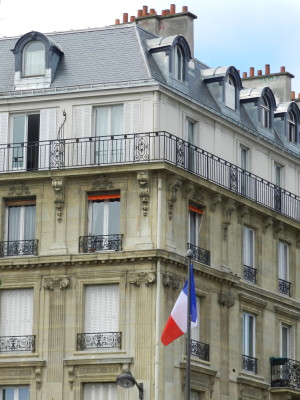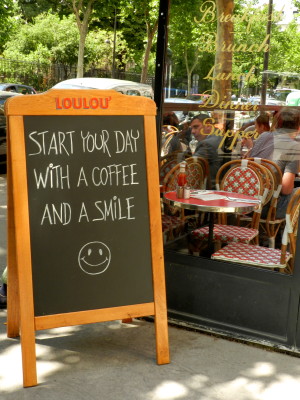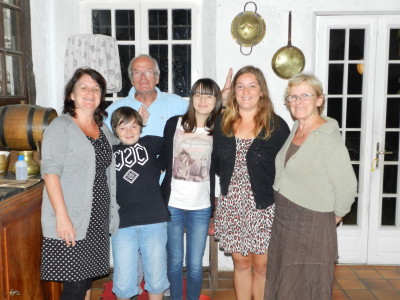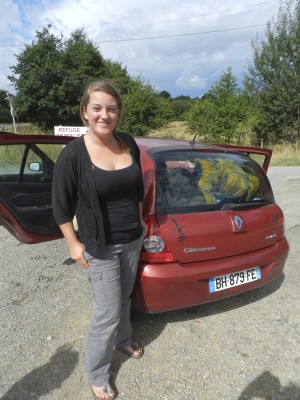Background
I traveled throughout France this summer (2013) for almost three months. During my journey I couch surfed, was hosted by French families, and did a few Workaway assignments. I arrived in Paris and then followed the coast and headed south after traveling to Brittany and Normandy. I visited Bordeaux, Biarritz, Bayonne, Dax, Avignon, Ax-en-Provence, Pamiers, and Marseille.
 I arrived in France not able to speak a word of French, knowing virtually nothing about this country other than having a vague impression of the culture from reading books like “A Moveable Feast” and watching foreign films. During my time here I’ve fallen for France in all its complexity. Here are some tidbits of knowledge I picked up along the way and some things I wish I’d known ahead of time! This is by no means an all-inclusive guide, rather a launching point for you to begin your own journey of discovery! Bon voyage!
I arrived in France not able to speak a word of French, knowing virtually nothing about this country other than having a vague impression of the culture from reading books like “A Moveable Feast” and watching foreign films. During my time here I’ve fallen for France in all its complexity. Here are some tidbits of knowledge I picked up along the way and some things I wish I’d known ahead of time! This is by no means an all-inclusive guide, rather a launching point for you to begin your own journey of discovery! Bon voyage!
Culture
French culture isn’t easily defined from an outsider’s perspective. It’s subtle and mysterious and varies depending on the region. Many people identify strongly with the region they’re from and reject the reputation of the “Parisian” French. The Bretagne culture in the north and the Basque and Catalan culture in the south are very prominent and distinct. It can be insulting to call someone with this heritage French as many of them want their independence from France!
Though it’s a very diverse country, there are some common social norms. French greet each other with at least two kisses (one on each cheek), sometimes more. It’s also important to use “Mr.” and “Mrs.” when entering stores, greeting taxi drivers, or speaking with clerks. However, it’s weird and not common at all to smile at strangers here, a habit that’s been tough for me to break!
 Personal space isn’t valued as highly as in the U.S., and this is reflected in the packed metros and the close proximity of cafe tables. Politeness is very important but the rules for being polite may include speaking softly, not being nosy about someone’s job, and not putting money directly in someone’s hand (most places have a tray where you can place your card or cash, however this rule isn’t fast and hard).
Smoking is very common and most outdoor spaces are filled with people smoking their cigarettes and enjoying an espresso. Materialism isn’t valued as highly here and I’ve had a lot of conversations about the craziness of American consumerism. Instead, the French place high priorities on education, family, and leisure.
Personal space isn’t valued as highly as in the U.S., and this is reflected in the packed metros and the close proximity of cafe tables. Politeness is very important but the rules for being polite may include speaking softly, not being nosy about someone’s job, and not putting money directly in someone’s hand (most places have a tray where you can place your card or cash, however this rule isn’t fast and hard).
Smoking is very common and most outdoor spaces are filled with people smoking their cigarettes and enjoying an espresso. Materialism isn’t valued as highly here and I’ve had a lot of conversations about the craziness of American consumerism. Instead, the French place high priorities on education, family, and leisure.
Restaurants/Dining Out
The French are neurotic about dining out. There are so many rules it’s unbelievable. I’m just starting to brave the restaurant experience and I still don’t understand the whole process. Here are some things I’ve observed that might make it easier: Menus for breakfast, lunch, and dinner usually include a suggested “plat de jour” which includes an appetizer (French entree), main course, and often dessert for a set price. It’s possible to order ‘a la carte’ but it will often be more expensive. Be careful as well about sitting down at a table vs. ordering from the “snack” menu which may be less expensive and may have different seating available.
Meal times are rigid and formal. It’s not possible to eat lunch before noon and dinner is usually served well after 7pm. If you only want to sit for a drink, you will often be moved to a different section of the restaurant or cafe to give preference to the people eating a full meal. “Aperitif” is a wonderful French institution, similar to happy hour before eating dinner. Alcohol such as Pastisse or beer is usually the drink of choice; it’s uncouth to have a glass of wine without a meal. You can usually find drink specials from 6-8 pm and many people will enjoy a light snack before moving on to another locale for dinner.
Servers can be abrupt and less than friendly. Unfortunately, I’ve found the reputation of the rude French waiter to often be true. However, I think this is just a reflection of the different expectations we have for the service industry and the impatience of the French for those who only speak English. A few things are helpful-ask for what you want, (more bread, water, wine, etc) and don’t be afraid to go to the bar or cash register to ask for your bill.
Food/Dining In
French cuisine is world renowned, and overall prepared with a great deal of care. Meat, cheese, and bread are staples and I can’t even pretend to be an expert on the varieties available (not to mention the plethora of French wine)! The Boulangerie/Patisserie (bakery/pastry shop) is my favorite institution and the reason I can barely fit into my pants! When I was in Paris I ate exclusively from the bakery which not only offers delicious pastries, but also has quiche, pizza, and paninis. I supplemented these meals with fruit and taboule from the local grocery store and saved a ton of money. If you have a bottle opener it’s worth it to buy your wine from the grocer as well, it will cost you half the price for a bottle as it will cost you to have one glass in a nice restaurant!
 Having a picnic in the park is a favorite French pastime, it’s also a perfect time to do some people watching. If you’re looking for cheap coffee, Tabac stores (the only place where you can buy cigarettes) usually have little cafe tables outside where they’ll serve espresso and coffee for a lot less than their neighbors.
Having a picnic in the park is a favorite French pastime, it’s also a perfect time to do some people watching. If you’re looking for cheap coffee, Tabac stores (the only place where you can buy cigarettes) usually have little cafe tables outside where they’ll serve espresso and coffee for a lot less than their neighbors.
I’ve had the pleasure of being invited into the homes of many lovely French families and sharing meals with them. Having a French meal is much like an orchestra coming together to create a beautiful symphony. It’s never rushed, and everyone participates. If you’re not doing the cooking you may be asked to set or clear the table, or help wash the dishes. Lunch is usually served between 1-2 pm while dinner can be as late as 9 or 10 pm with the aperitif taking place around 8 pm. Meals are served family style and are usually outdoors, weather permitting. Unless told otherwise, wait to be served and don’t pour your own glass of wine. It’s polite to let the host/hostess begin with the serving and you’ll usually be asked if you prefer red or white wine to start. It’s common to say a cordial “bon appetite!” before beginning, and the French usually only eat one dish at a time, preferring to clean their entire plate before adding more food. The French never use their hands to eat (with the exception being bread) and eat with both a fork and a knife, something that can take some getting used to. Meal time is meant to be enjoyed and conversation is often lively. From the beginning of aperitif time to the end of the meal when the cheese course is being served (yes, the French eat cheese after the meal, often for dessert), two hours can easily be passed. Enjoy and appreciate the experience, it’s truly unique!
Language
I saw a kid the other day wearing a shirt with the British flag that said, (in English) “Stay French.” This pretty much sums up the attitude of most people in France. While they have to learn English in school, many are reluctant to speak it and will insist that you learn French if you want to communicate with them (which you should do anyway). At first, I thought this was a stubborn snobbery and felt frustrated by the unwillingness of someone to speak to me even if they understood and spoke English. Now I realize it’s less of a snobbery and more of a national sheepishness. Even though completely untrue, most French think their English is horrible. I’ve had far more luck talking to people in southern France in Spanish than English because they are embarrassed of their English accent. Unfortunately, there’s not much anyone can do about this and if things get really sticky they will usually try to help you, but don’t count on any long drawn out conversations or friendly invites for coffee.
 That being said, I’ve had lovely experiences with the families I’ve stayed with and my couch surfing hosts who will usually go out of their way to get to know me and practice their English. They’ve been friendly, open, and interesting. If I tell them I actually want to learn French, they will make an effort to speak slowly and explain what I don’t understand. Showing an effort and willingness to at learn French goes a long way and can be very rewarding. It’s a difficult language that I can’t even begin to master, but it’s a beautiful and internationally significant language that is worth appreciating.
That being said, I’ve had lovely experiences with the families I’ve stayed with and my couch surfing hosts who will usually go out of their way to get to know me and practice their English. They’ve been friendly, open, and interesting. If I tell them I actually want to learn French, they will make an effort to speak slowly and explain what I don’t understand. Showing an effort and willingness to at learn French goes a long way and can be very rewarding. It’s a difficult language that I can’t even begin to master, but it’s a beautiful and internationally significant language that is worth appreciating.
Transportation
I’ve traveled through France using a combination of train travel and covoiturage, a great car-pooling network available for drivers and passengers. Honestly, covoiturage (or Bla Bla Car) is MUCH cheaper and often easier to use than train travel, though it requires setting up an online account and can be challenging if you don’t have a French phone to communicate with the drivers. For more info about car-sharing in France, read this post.
 If you’re not comfortable with car-pooling, France is easily navigated by train. The main train company is SNCF and even small towns usually have a train station that connects to larger cities. Be careful about buying a France rail pass though as you may still have to pay for reservation fees and may not get your money’s worth. If you are 25 and younger you can receive a reduced tariff (bonus!) for all of your train tickets. Most towns also have a reliable and cheap bus system that makes transportation a no-brainer in France.
Of course, bicycling is always a good alternative and many larger cities like Paris have a bike sharing program you can use as well.
If you’re not comfortable with car-pooling, France is easily navigated by train. The main train company is SNCF and even small towns usually have a train station that connects to larger cities. Be careful about buying a France rail pass though as you may still have to pay for reservation fees and may not get your money’s worth. If you are 25 and younger you can receive a reduced tariff (bonus!) for all of your train tickets. Most towns also have a reliable and cheap bus system that makes transportation a no-brainer in France.
Of course, bicycling is always a good alternative and many larger cities like Paris have a bike sharing program you can use as well.
Do you have any pieces of advice or wisdom to share? What are your favorite and least favorite things about France? I’d love to hear your comments!
Google+
3 Comments
Thank you so much for your work.It’s very helping to me.give me some advice.I will wait for your reply
Hi, I Am Mukseln Co-founder of French Truly (an online French language School). After growing up in France and
living abroad (Turin Italy, London UK, and Seattle US) for 14 years, I like to call myself a proud citizen of
the world who truly understands the concept of diving into a new culture and language.
This is really a great article and a great read for me. It’s my first visit to your blog and I have found it so useful and informative. Thank you